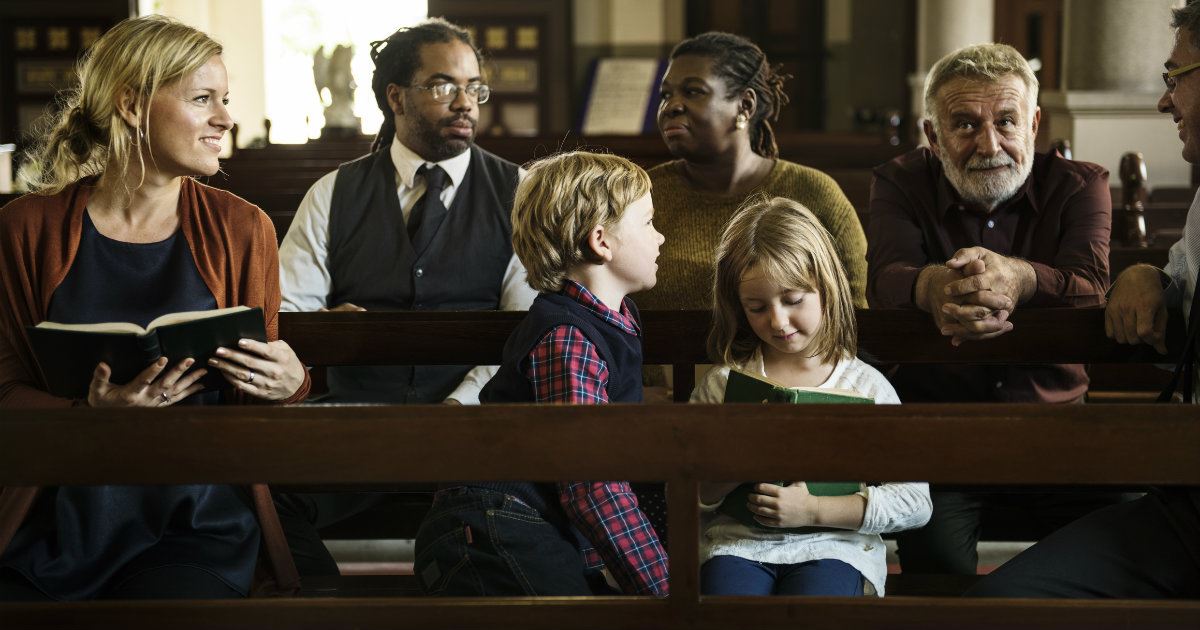5 Things Your Child Might Be Learning at Church That Aren't in the Bible

A Christian heritage is a beautiful thing. Raising our children in church plants seeds that later will yield a bountiful harvest. “Train up a child in the way he should go;even when he is old he will not depart from it” (Proverbs 22:6 ESV) However, as important as it is for your child to be in church, it’s just as essential to understand what your child is being taught in church.
Churches today often separate kids from the main congregation completely, offering “children’s church” after their small group classes and performing a mini service on a child’s level. There are pros and cons to this method, but regardless of what type of class or service your child is attending each week, we as parents must be diligent to know what they’re hearing and to combat any misunderstandings with biblical truth, if needed. As stressed out, busy parents, it is all too easy to blindly trust the teachers and staff of a church.
Do You Know What Your Children Are Learning?
Think about how familiar this Sunday scenario feels: Family arrives at church, already weary from the hassle to get out the door. The parents drop the kids off at Sunday School, escape to their adult class, desperately clutching coffee, and proceed afterward to the adult service, while the children get shuffled from small group to their own kid-service in the gym. Afterward, parents feel refreshed from hearing the word and participating in corporate worship, and might ask the children on the way to lunch “how was your service?” A half-hearted chorus of “good” floats from the backseat, and the next thing you know, you’re arguing over who wants pizza or burgers. And that’s the end of it until the next Sunday.

Photo Credit: Getty Images
This is dangerous. We must be diligent to recognize the pitfalls of theology that many Protestant churches are falling prey to with our kids. As adults, we don’t assume a pastor is infallible—we check his words against Scripture, as the Bible instructs us to do. Likewise, we shouldn’t assume the teaching our children receive is without error either. Don’t be lazy—know what your children are learning!
Here are 5 things your child might be learning at church that aren’t in the Bible:
1. God is only love.
God is love, of course—but when we teach our children that God is only love, we ignore the part of His character that is wrath and justice. Teachers tend to shy away from this topic in Sunday School, because it can be hard to grasp that God can be angry, and extract vengeance and justice without sinning. After all, typically when kids—or adults!—respond in anger, it’s a sin. But it's crucial for our kids not to believe this aspect of the Lord doesn't exist:
- “For the wrath of God is revealed from heaven against all ungodliness and unrighteousness of men, who by their unrighteousness suppress the truth.” (Romans 1:18 ESV)
- “Behold the storm of the Lord!Wrath has gone forth, a whirling tempest; it will burst upon the head of the wicked.” (Jeremiah 30:23 ESV)
The mindset "God is only love" is what is leading our young people astray into a religion of tolerance and "you do you." To correct that mindset, it must start with children learning the truth and the whole character of God from the very beginning. If not, the consequences are devastating to an entire generation.
2. We are all God's children.
This can be tricky, because God is indeed the Creator of all people. However, He is not the Father of all. Romans 8:9 says “if anyone does not have the spirit of Christ, he does not belong to Christ.” InJohn 8:44, Jesus said those who are apart from Him are children of Satan, the “father of lies.” Also, Romans 8:15 tells us, when we receive God’s spirit we have received “a spirit of adoption as sons by which we cry out, ‘Abba! Father!’” So, we are all God’s creation, and we are all made in God's image. We bear the Imago Dei. But we are not all God’s children. Only those who are saved are children and heirs with Christ. This is an important distinction.
3. Salvation is partly your child’s job and partly God's job.
Many Protestants today teach children that they are to "accept Christ," as if the Lord is desperately wringing His hands and hoping they'll choose Him. In actuality, it is the Lord alone who draws children—and adults—to Himself. We get no credit for salvation. The concept that churches, however subconsciously, are pushing "poor Jesus, hoping you'll let him into your heart" is damaging to the true image of Christ.

Photo Credit: Getty Images
Christ is humble, but not weak. He is a lamb, but also a warrior. He is everything we need for salvation—any effort or work on our part has zero to do with it.
“All that the Father gives me will come to me, and whoever comes to me I will never cast out.” (John 6:37 ESV)
“No one can come to me unless the Father who sent me draws him.” (John 6:44 ESV)
Preach the Gospel to your child. Surround them with the love of Christ. Walk out your faith in front of them. And pray for the Holy Spirit to draw them to Himself.
4. Doctrine doesn't matter—just love Jesus.
Churches today are damaging our children by teaching them they only need to love Jesus and not worry about the rest. While loving Jesus is crucial, knowing the doctrine you believe is also essential to walking out your faith. 1 Peter 3:15 (ESV) says, “but in your hearts honor Christ the Lord as holy, always being prepared to make a defense to anyone who asks you for a reason for the hope that is in you; yet do it with gentleness and respect.” How can you give an answer for the hope that is in you if you’ve limited your entire pool of theology to the words "Jesus loves me"?
Would you marry your spouse and say you love them, but never learn anything else about them? Never find out where they came from, what makes them tick, what they love, what they hate, etc.? Of course you wouldn’t. You show your love by investing time and energy into that person. The way we learn about God is through His word. If we don’t teach our children to invest time and energy into the Word as well, they will be spiritually stunted.
5. If they pray a magic prayer and walk an aisle, they're saved for all eternity.
This is perhaps the most dangerous lie taught in churches today. In an effort to assure young people of their salvation, teachers and pastors will often ask "Have you ever prayed the sinner's prayer?" They’ll pitch that the equivalent of praying at an emotionally-hype youth camp, walking an aisle, signing a membership card, and getting a quick dunk in the baptismal tank will guarantee that person’s salvation for all eternity. They’ll even use Scriptures like John 10:28 to back it up. “I give them eternal life, and they will never perish, and no one will snatch them out of my hand.”
But that misunderstanding of salvation is what will have many people hearing the dreaded words of Matthew 7:21-23 (ESV): “Not everyone who says to me, ‘Lord, Lord,’ will enter the kingdom of heaven, but the one who does the will of my Father who is in heaven. On that day many will say to me, ‘Lord, Lord, did we not prophesy in your name, and cast out demons in your name, and do many mighty works in your name?’ And then will I declare to them, ‘I never knew you; depart from me, you workers of lawlessness.’”

Photo Credit: Getty Images
Scripture makes it clear that we are to persevere in our salvation, pressing on in faith until the end:
- “Therefore, my beloved, as you have always obeyed, so now, not only as in my presence but much more in my absence, work out your own salvation with fear and trembling.” (Philippians 2:12)
- “and if children, then heirs—heirs of God and fellow heirs with Christ, provided we suffer with him in order that we may also be glorified with him.” (Romans 8:17 ESV)
Don’t get me wrong—we can’t lose our salvation. But if there is no desire in us to strive for holiness, to hate our sin, to frequently repent, and to strive forward in sanctification, we might need to wonder if we were ever truly saved. Teaching our children that they can make a surface level decision, potentially based on the emotion of their environment, get baptized (or not) and then live as if nothing changed, but now with their “fire insurance,” is the worst thing we could ever do for them.
Be involved in what your children are taking away from their time at church. After all, the church isn’t primarily responsible for our children’s spiritual upbringing—we are.

Photo Credit: Unsplash/Ben White
Originally published July 12, 2019.





